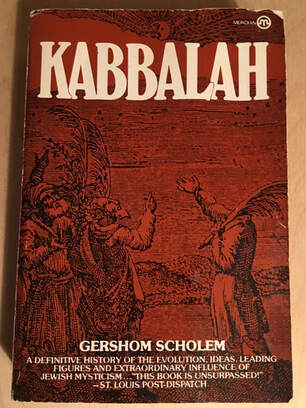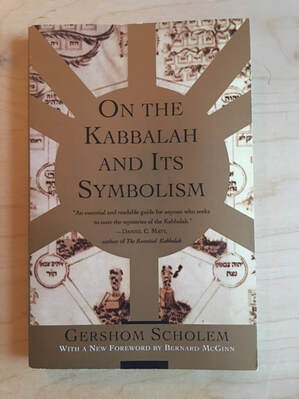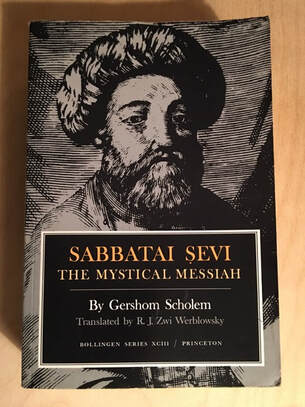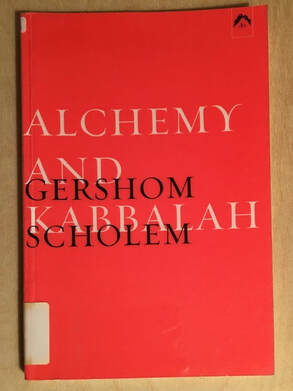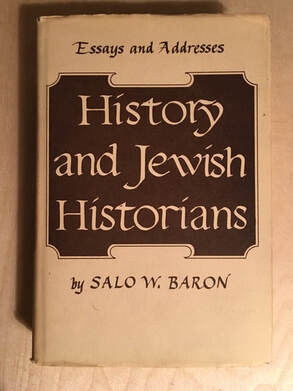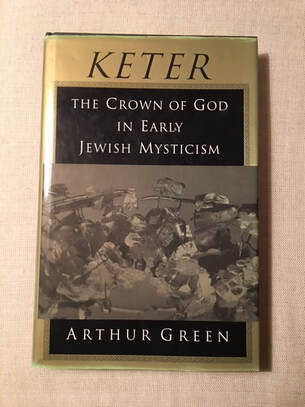MY KABBALAH LIBRARY
Here you will find books I own, have read or am actively reading, which inform my understanding and meditative practice of Kabbalah, Jewish inner tradition. I am a non-Jewish person learning about a huge, beautiful, revelatory, and complex topic. I hope to gain whatever wisdom and comprehension I can, from this absorbing and valuable body of material.
I have an extensive library, so I will add titles in the order in which I have read them, and take photos of my own actual books. I will also share internet sources which I have found valuable. I will try to add more books intermittently, until I have them all on site. This should answer any questions about my style of study, and general orientation to learning about the topic. This list, April 2024, represents about 25% of my collection, so it is not my complete library.
I am not teaching Judaism, nor do I have an opinion on what Judaism is, because I am outside the tradition and the people, and cannot have a valid opinion. I do not teach Christian cabala, nor hermetic qabbalah. I have read and studied only Jewish authors, scholars, and historians, because they are the origin and authority, in my opinion.
The books you see here inform my personal understanding. I syncretize and simplify many foundational and basic views, evaluations, and interpretations from the advanced writings of brilliant scholars, historians, and thinkers of today and history. For instance, I take note when two highly honored scholars disagree with each other, and attempt to learn and understand why.
Please note, these books are NOT how I teach Beginner Kabbalah or Beginner Tarot & Kabbalah, my classes for the unaffiliated gateway student. I pack all that I know into those classes, to inform their journey responsibly, and help them in life, no matter what their traditions. My beginner classes are for beginners and are intended to encourage further study. If students are drawn to learn about Judaism, there are other avenues for that pursuit. I simply prefer to learn from the originators of Kabbalah, rather than those who came later. So here are my books.
Here you will find books I own, have read or am actively reading, which inform my understanding and meditative practice of Kabbalah, Jewish inner tradition. I am a non-Jewish person learning about a huge, beautiful, revelatory, and complex topic. I hope to gain whatever wisdom and comprehension I can, from this absorbing and valuable body of material.
I have an extensive library, so I will add titles in the order in which I have read them, and take photos of my own actual books. I will also share internet sources which I have found valuable. I will try to add more books intermittently, until I have them all on site. This should answer any questions about my style of study, and general orientation to learning about the topic. This list, April 2024, represents about 25% of my collection, so it is not my complete library.
I am not teaching Judaism, nor do I have an opinion on what Judaism is, because I am outside the tradition and the people, and cannot have a valid opinion. I do not teach Christian cabala, nor hermetic qabbalah. I have read and studied only Jewish authors, scholars, and historians, because they are the origin and authority, in my opinion.
The books you see here inform my personal understanding. I syncretize and simplify many foundational and basic views, evaluations, and interpretations from the advanced writings of brilliant scholars, historians, and thinkers of today and history. For instance, I take note when two highly honored scholars disagree with each other, and attempt to learn and understand why.
Please note, these books are NOT how I teach Beginner Kabbalah or Beginner Tarot & Kabbalah, my classes for the unaffiliated gateway student. I pack all that I know into those classes, to inform their journey responsibly, and help them in life, no matter what their traditions. My beginner classes are for beginners and are intended to encourage further study. If students are drawn to learn about Judaism, there are other avenues for that pursuit. I simply prefer to learn from the originators of Kabbalah, rather than those who came later. So here are my books.
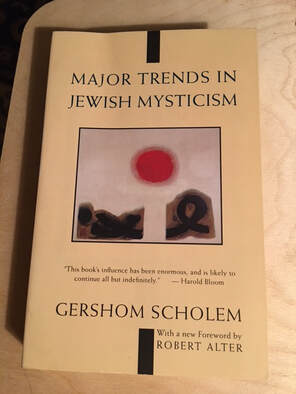
Major Trends in Jewish Mysticism
Gershom Scholem
Foreword by Robert Alter
This is where it all started for me, in terms of study and exposure to theory and history. I read this on the recommendation of a famous Tarotist, and the whole topic came alive for me in a way perfect for my understandings. I always learn top-down, starting with huge overviews and then going deeper, rereading and reconceiving, adjusting my thought as I go.
I began a deep dive into Gershom Scholem's awe-inspiring body of work. MTJM is a highly recommended overview of the flows of rabbinical interpretation over 800 years of history. First read by me in 2014, after 20 years of verbal inquiry which had led me basically nowhere. So nice to find the track in the wilderness.
Purchased in 2014
Added to page Sept 20, 2022
Gershom Scholem
Foreword by Robert Alter
This is where it all started for me, in terms of study and exposure to theory and history. I read this on the recommendation of a famous Tarotist, and the whole topic came alive for me in a way perfect for my understandings. I always learn top-down, starting with huge overviews and then going deeper, rereading and reconceiving, adjusting my thought as I go.
I began a deep dive into Gershom Scholem's awe-inspiring body of work. MTJM is a highly recommended overview of the flows of rabbinical interpretation over 800 years of history. First read by me in 2014, after 20 years of verbal inquiry which had led me basically nowhere. So nice to find the track in the wilderness.
Purchased in 2014
Added to page Sept 20, 2022
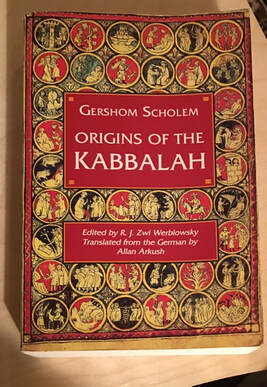
Origins of the Kabbalah
Gershom Scholem
After the Major Trends' liberating overview of centuries of kabbalistic thought in its waves of evolution, I was ready for more. Here we have discussion of the background environment of the emergence of a written history, with Book Bahir, and geographic locations of early solid development. This book led me to buy the Book Bahir. After reading this, I was a committed fan of Gershom Scholem, and had decided to read everything he ever published.
Purchased in 2015
Added to page Sept 21, 2022
Gershom Scholem
After the Major Trends' liberating overview of centuries of kabbalistic thought in its waves of evolution, I was ready for more. Here we have discussion of the background environment of the emergence of a written history, with Book Bahir, and geographic locations of early solid development. This book led me to buy the Book Bahir. After reading this, I was a committed fan of Gershom Scholem, and had decided to read everything he ever published.
Purchased in 2015
Added to page Sept 21, 2022
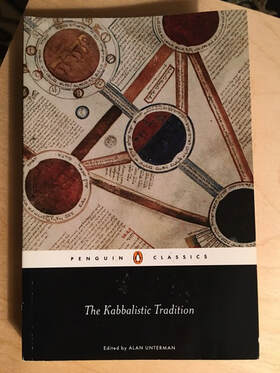
The Kabbalistic Tradition
Alan Unterman
Here we have a fantastic overview of all kinds of topics within the study of kabbalah. You will find excerpts highlighting history and meaning of terms frequently used, from a group of famous and influential kabbalah students and masters in history, beginning with Chaim Vital, student of Isaac Luria. It's a great overview of key ideas from specific teachers, both for starting, and for review of the breadth of the topic.
Purchased in 2016
Added to page Sept 22, 2022
Alan Unterman
Here we have a fantastic overview of all kinds of topics within the study of kabbalah. You will find excerpts highlighting history and meaning of terms frequently used, from a group of famous and influential kabbalah students and masters in history, beginning with Chaim Vital, student of Isaac Luria. It's a great overview of key ideas from specific teachers, both for starting, and for review of the breadth of the topic.
Purchased in 2016
Added to page Sept 22, 2022
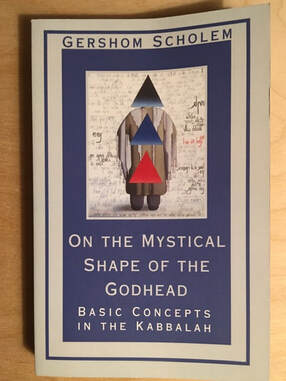
On the Mystical Shape of the Godhead
Gershom Scholem
Foreword by Joseph Dan
I was on a mission by now, to find and purchase the pertinent Scholem books in case they got away! I expected that I would find some of his titles were for later in my studies, but I grabbed this one because the chapter headings were so interesting to me. I saw a treatment of evil, and one on reincarnation, and wanted to see how Judaism viewed these things, historically, in connection with kabbalah. I continued to find pleasure in the immense readability of Gershom Scholem's writings, which I would later discover was not the case with other great scholars of kabbalah, such as Elliot R. Wolfson. I was in the brand newness of things.
I did not know who Joseph Dan was at that point, so did not recognize the significance of his having written the foreword. That is part of the fun of such a journey of review from the beginning to the current moment. I later bought Joseph Dan's four books on Jewish Mysticism and was delighted to get my hands on them at any price. But, more on that later!
Purchased in 2015
Added to page Sept 23, 2022
Gershom Scholem
Foreword by Joseph Dan
I was on a mission by now, to find and purchase the pertinent Scholem books in case they got away! I expected that I would find some of his titles were for later in my studies, but I grabbed this one because the chapter headings were so interesting to me. I saw a treatment of evil, and one on reincarnation, and wanted to see how Judaism viewed these things, historically, in connection with kabbalah. I continued to find pleasure in the immense readability of Gershom Scholem's writings, which I would later discover was not the case with other great scholars of kabbalah, such as Elliot R. Wolfson. I was in the brand newness of things.
I did not know who Joseph Dan was at that point, so did not recognize the significance of his having written the foreword. That is part of the fun of such a journey of review from the beginning to the current moment. I later bought Joseph Dan's four books on Jewish Mysticism and was delighted to get my hands on them at any price. But, more on that later!
Purchased in 2015
Added to page Sept 23, 2022
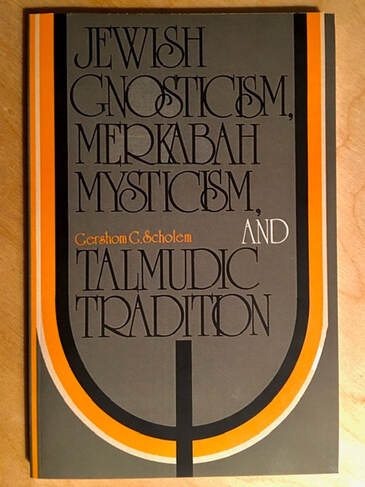
Jewish Gnosticism, Merkabah Mysticism, and Talmudic Tradition
Gershom Scholem
Published by the Jewish Theological Seminary of America, and dedicated from Hebrew University, this slim volume contains articles on Hekhalot mysticism, Metatron and Akatriel, a mention of the Age of Shier Komah in Origen, and the difference between Gnostic and Jewish sources. It is deep water. Each article is short and to the point. I found it helpful because it underscores the thoroughness of earlier thinkers in moving toward things that were later deemed inappropriate. Finding the living thread which enables these contacts and connections in direct gnosis would have been thrilling, and they were diligent. I found the book helpful because it made it so clear that even deeply experienced people of prayer can founder when exploring the edges. It is inspiring and also a cautionary tale. There are not many who can study this material with their actual practice, even in community and supervision.
Once again, I find myself delighted to review the books I bought and read in the early stages. People always tell me I can't read these things. Then of course I follow my inner promptings. There is a difference between spiritual greed and the quiet suggestions of spirit.
Purchased in 2016
Added to page Sept 24, 2022
Gershom Scholem
Published by the Jewish Theological Seminary of America, and dedicated from Hebrew University, this slim volume contains articles on Hekhalot mysticism, Metatron and Akatriel, a mention of the Age of Shier Komah in Origen, and the difference between Gnostic and Jewish sources. It is deep water. Each article is short and to the point. I found it helpful because it underscores the thoroughness of earlier thinkers in moving toward things that were later deemed inappropriate. Finding the living thread which enables these contacts and connections in direct gnosis would have been thrilling, and they were diligent. I found the book helpful because it made it so clear that even deeply experienced people of prayer can founder when exploring the edges. It is inspiring and also a cautionary tale. There are not many who can study this material with their actual practice, even in community and supervision.
Once again, I find myself delighted to review the books I bought and read in the early stages. People always tell me I can't read these things. Then of course I follow my inner promptings. There is a difference between spiritual greed and the quiet suggestions of spirit.
Purchased in 2016
Added to page Sept 24, 2022
|
Kabbalah
Gershom Scholem Once I had a good overview of the developments in thinking over centuries, and a quick review of the esoteric topics which tend to thrill meditators and mystics, it was back to the basics of history, in greater detail. I really enjoy the history of development, and that's what this is. We see kabbalah being centered in local areas, moving around, expressed by Hasids, and reinterpreted again everywhere. There is a section on basic ideas of kabbalah, general concepts. Lastly, there is a section on specific topics, for those who wish to dial in tightly on words or subjects they have heard about but do not know. This work is a very good beginning for someone who is ready for more detail but still working in big, big frames of history and general understandings of kabbalah. This phase, properly, should last a long time. It's a good, solid book for basics. Added to page Sept 25, 2022 |
|
On the Kabbalah and Its Symbolism Gershom Scholem This title addresses very broad concepts such as kabbalah and mysticism, the meaning of Torah in kabbalah, myth and kabbalah, and tradition versus new creation in ritual. Practical kabbalists are not the most common type, but knowing the overview, once again, informs our overall comprehension of what kabbalah is intended to be, or can be. It's not just theory for intellectuals. This is a good and helpful book. Purchased in 2015 Added to page Sept 25, 2022 |
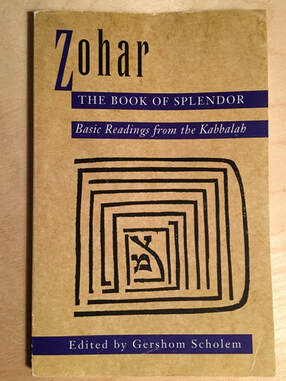
Zohar, The Book of Splendor
Basic Readings from the Kabbalah
Gershom Scholem, Editor
This very excellent little book is arranged by topics and stories, which give the spirit and somewhat of a map of the sense of kabbalah, in the estimation of Gershom Scholem. At only about 100 pages, it is a great tone poem about this fascinating subject. In my opinion, it takes, at the very least, years of simply examining basic overviews, to even approach kabbalah. This search for kernels and minimalisms can be quite joyful, and gives us much to ponder. There is no rush.
Purchased in 2016
Added to page Oct 1,, 2022
|
Sabbatai Sevi , The Mystical Messiah
Gershom Scholem Impressive and highly detailed story of the cautionary tale which is Sabbatai Tzvi. I was told by a former Lubavitcher that Sabbatai Tzvi horrified rank and file messianists so thoroughly that mainstream Judaism backed away from messianism almost entirely for a hundred years. Promoted and publicized by a devotee, this man became acclaimed as a mystical leader and messiah, only to move into superceding of the guardrails of daily practice and into full embrace of freedom of practice, known widely as antinomianism. The rules do not apply to advanced people, they say. This is typically the outer edge of belief and practice, on the absolute boundary of heretical practice. So it is usually shocking, and it was here, too. Finally, in converting to Islam, Sabbatai Tzvi rocked his world of the faithful, and many beyond his adherents, with far-reaching waves of effect. To me, this is a sad and powerful story, and I frankly am not ready to read it, although more than one scholar of deep faith has recommended it, not least because of the wealth of additional and related information provided by Scholem in the text. I don't know. I am not sure the time is right. Dov Bashevkin read it recently and strongly encouraged me to give it my time. I will, I will! At the proper moment. Purchased in 2016 Added to page Oct 1,, 2022 |
|
Alchemy and Kabbalah
Gershom Scholem Here we have a title I purchased to read at a later date, and by now, 8 years later, that date has not yet arrived. My main field of effort often intersects scholars of the history of the study of alchemy as a refinement of the spirit of man, so when I saw this, I grabbed it. I was deeply engaged in reading the history of kabbalah, and branching out a bit into myths and legends of the Jewish people, so I did not slow down for this book. Gershom Scholem referred in the dedication to his earlier, exuberant days of scholarship in the topic of kabbalah. He states that his age and further studies had changed his approach and perspective, but he still celebrated and valued the enthusiasm and ambition of his first foray into this topic, which he promised to cite for reference in this newer writing. Roughly 100 pages, it will be wonderful when I get to it. If my scholarly friends are still alive at that point, we will discuss! Purchased 2016 Added to page Oct 1,, 2022 |
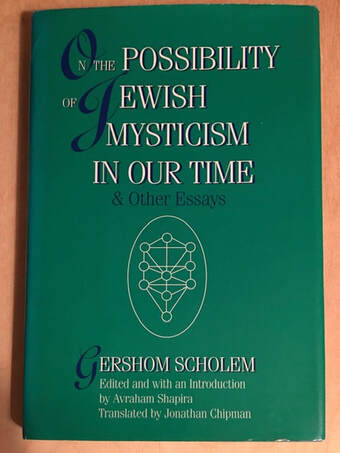
On the Possibility of Jewish Mysticism in Our Time,
and Other Essays
Gershom Scholem
When I saw this, I jumped. By now, I was buying any Scholem title which popped up in my searches. I wanted to make sure I had them all, for that quiet time in the future when I would be reading and studying to my heart's content, on the topic of kabbalah. By now, I could no longer discuss kabbalah with my Tarot friends, who all studied the hermetic version which I reject, nor my Jewish friends, who did not know anything about it and were a little unsure how to accept my study of a Jewish depth experience. So there was nothing left for me but to collect, read, ponder, formulate.
This title approaches the personal views of Gershom Scholem on Jewish Mysticism, and then looks at the nature of Jewish people and their experience, and examines history, the questions related to What Is a Jew, and What is Judaism, Zionism, language, modern studies, messianism, and whether or not G*d dwells in the heart of an atheist. As far as I am concerned, his views matter, on all of this. Society has changed, the world has changed, and his own students may currently diverge from his foundations, but Gershom Scholem was a forerunner, and should be read fully.
Purchased in 2016
Added to page Oct 1,, 2022
and Other Essays
Gershom Scholem
When I saw this, I jumped. By now, I was buying any Scholem title which popped up in my searches. I wanted to make sure I had them all, for that quiet time in the future when I would be reading and studying to my heart's content, on the topic of kabbalah. By now, I could no longer discuss kabbalah with my Tarot friends, who all studied the hermetic version which I reject, nor my Jewish friends, who did not know anything about it and were a little unsure how to accept my study of a Jewish depth experience. So there was nothing left for me but to collect, read, ponder, formulate.
This title approaches the personal views of Gershom Scholem on Jewish Mysticism, and then looks at the nature of Jewish people and their experience, and examines history, the questions related to What Is a Jew, and What is Judaism, Zionism, language, modern studies, messianism, and whether or not G*d dwells in the heart of an atheist. As far as I am concerned, his views matter, on all of this. Society has changed, the world has changed, and his own students may currently diverge from his foundations, but Gershom Scholem was a forerunner, and should be read fully.
Purchased in 2016
Added to page Oct 1,, 2022
|
History and Jewish Historians
Salo Wittmayer Baron This highly respected man, called "the greatest Jewish historian of the last century", objected to the characterization of Jewish experience across the centuries as "lachrymose" or sad and scholarly, in favor of the view that joy and redemption were equally important and characteristic dynamics of the Jewish people in their history. He asks the question, Who is a Jew, and then looks back on Maimonides, and reviews the basic outlooks of major Jewish historians of note. I have not read this one yet, but it seems essential, in view of my discovery that multiple more modern scholars have departed from Gershom Scholem's attitudes and arrangements. Received as a gift, 2017 Added to page Oct 1,, 2022 |
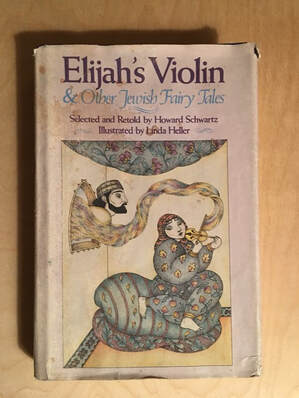
Elijah's Violin & Other Jewish Fairy Tales
Howard Schwartz
Alerted to this title by a friend of mine who taught storytelling at the Jewish Theological Seminary in NYC, I snapped it up. He read me a tale from this book, and I recall intuitively interjecting, "I am the scorpion!" whereupon he laughed and continued to tell me the rest of the tale.
I had already collected Louis Ginzberg's set, Legends of the Jews, all but Volume V index, and I had Howard Schwartz' Tree of Souls, and a book about all the angels of Judaism from every tradition. So this was a lovely addition to my potentials, and one day I hope to have a group of students in house, to read and discuss these tales within and outside their own traditions.
Purchased 2020
Added to page Oct 1,, 2022
Howard Schwartz
Alerted to this title by a friend of mine who taught storytelling at the Jewish Theological Seminary in NYC, I snapped it up. He read me a tale from this book, and I recall intuitively interjecting, "I am the scorpion!" whereupon he laughed and continued to tell me the rest of the tale.
I had already collected Louis Ginzberg's set, Legends of the Jews, all but Volume V index, and I had Howard Schwartz' Tree of Souls, and a book about all the angels of Judaism from every tradition. So this was a lovely addition to my potentials, and one day I hope to have a group of students in house, to read and discuss these tales within and outside their own traditions.
Purchased 2020
Added to page Oct 1,, 2022
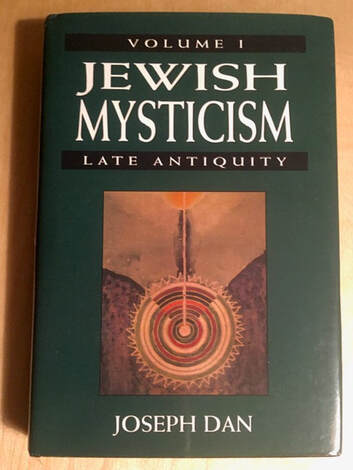
Jewish Mysticism: Volume I, Late Antiquity
Joseph Dan
I was very excited to discover this scholar, whose writing is very accessible and direct. This is a four volume set, which I acquired painstakingly and with the help of a friend. The volumes were close to one hundred usd new, but I was able to obtain at least one in brand new condition for much less. Another was a gift, and onward until I succeeded. I am about two thirds through it, and it is fascinating background information which I am very glad to have.
Hekhalot, Merkavah! By now I knew that I had no business in hekhalot or merkavah until I had a much stronger understanding of basic history of kabbalah, terminology, concepts of the oral Torah, and other foundational contexts, so that I would have some general comprehension of context of experience before delving into specific mystical practices. Prudence! I had a certain instinctive and native attraction to these topics, but there is plenty of time to reach them, and more importantly, at the right time. My initial attraction was the same as my early experiences of personal mysticism. What the heck is happening to me when I pray? How to explain these extraordinary experiences which other people seem not to be having, but I am?
So I stayed concerned with phases of Sefir Yetzirah, and historicity, detached a bit, and let Joseph Dan talk in his own way about these rarefied practices among the deep students of kabbalah, long ago.
This is the type of book you read more than once. Firstly, for the overview, later for recognition, and later, for information, and again, for perspective.
Received as a gift, 2019
Added to page Oct 2,, 2022
Joseph Dan
I was very excited to discover this scholar, whose writing is very accessible and direct. This is a four volume set, which I acquired painstakingly and with the help of a friend. The volumes were close to one hundred usd new, but I was able to obtain at least one in brand new condition for much less. Another was a gift, and onward until I succeeded. I am about two thirds through it, and it is fascinating background information which I am very glad to have.
Hekhalot, Merkavah! By now I knew that I had no business in hekhalot or merkavah until I had a much stronger understanding of basic history of kabbalah, terminology, concepts of the oral Torah, and other foundational contexts, so that I would have some general comprehension of context of experience before delving into specific mystical practices. Prudence! I had a certain instinctive and native attraction to these topics, but there is plenty of time to reach them, and more importantly, at the right time. My initial attraction was the same as my early experiences of personal mysticism. What the heck is happening to me when I pray? How to explain these extraordinary experiences which other people seem not to be having, but I am?
So I stayed concerned with phases of Sefir Yetzirah, and historicity, detached a bit, and let Joseph Dan talk in his own way about these rarefied practices among the deep students of kabbalah, long ago.
This is the type of book you read more than once. Firstly, for the overview, later for recognition, and later, for information, and again, for perspective.
Received as a gift, 2019
Added to page Oct 2,, 2022
|
Keter: The Crown of God in Early Jewish Mysticism
Arthur Green So fine to discover Arthur Green! A wonderfully direct and understandable writer for crossover audiences but also deeply meaningful to those within Judaism. Here he looks as mystical and symbolic thinking in the Jewish tradition, examining the oldest myths and inheritances, leading to the Middle Ages realm of developments, such as Kabbalah in Safed, Spain. This book specifically examines ideas around the notion of the divine Crown, crowning, and coronation, all related ideas. The crowning of angels, even! The crown in marriage. Since the Crown, keter, is the first of the emanations, of the great wheels of intent and dynamic, it is worth some review in Jewish history of thought. My discovery of Arthur Green led me to other excellent studies, which you will see later in this stream. Purchased 2021 Added to page Oct 2,, 2022 |
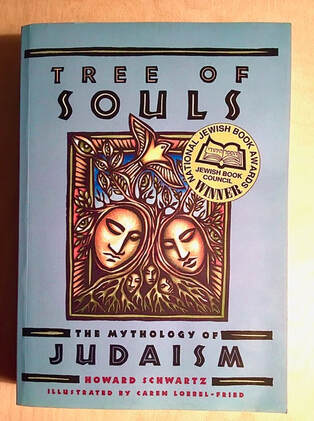
Tree of Souls: The Mythology of Judaism
Howard Schwartz
This is one of the world's beloved books. Once you pop it open, you will easily see why.
Divided into Ten Books, with over 500 pages of text and 100 pages of index, notes, and bibliography, it collects and tells:
Purchased in 2016
Added to page Oct 6,, 2022
Howard Schwartz
This is one of the world's beloved books. Once you pop it open, you will easily see why.
Divided into Ten Books, with over 500 pages of text and 100 pages of index, notes, and bibliography, it collects and tells:
- The Myths of God
- The Myths of Creation
- The Myths of Heaven
- The Myths of Hell
- The Myths of the Holy Word
- The Myths of the Holy Time
- The Myths of the Holy People
- The Myths of the Holy Land
- The Myths of Exile
- The Myths of the Messiah
Purchased in 2016
Added to page Oct 6,, 2022
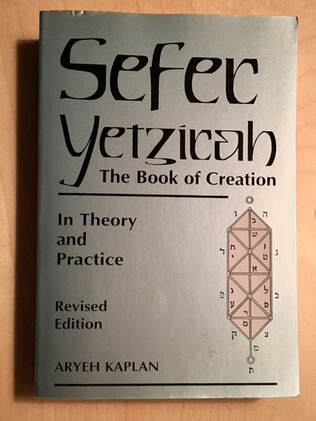
Sefer Yetzirah, The Book of Creation, In Theory and Practice
Aryeh Kaplan
This is a deep work, a primary resource, and not a book to wade into looking for proofs. If you come in here looking for answers, you will find them, and they will contradict each other in many cases, and open more queries, perhaps, than they resolve. I bought this because I had heard it was the first book on Kabbalah. I came looking for information on how to understand the great dynamics. I found diagrams, which gave me permission to be in an exploratory state with respect to Tree of Life shapes as they evolved over centuries. I went through the index looking for Keter, Chokmah, Binah, Chesed, Gevurah, Tifaret, Netzach, Hod, Yesod, and Malkuth, and Daath. I found them. Beyond that, I found conundrums.
Acknowledging that I was a total newbie, I did not let that deter me, but kept on going, ever following the little fish of my curiosity as it swam forth, guided by my inspiration. At one point I wondered if Archangels were in this book. I discovered the omnipresence of Archangels and angels throughout. I set this book aside for a time when I would have a more mature understanding of the basics, and I treasure it. This is not a book to read on a cherry-picking mission. It really demands time and respect.
Received as a gift 2014
Added to page Nov 8, 2022
Aryeh Kaplan
This is a deep work, a primary resource, and not a book to wade into looking for proofs. If you come in here looking for answers, you will find them, and they will contradict each other in many cases, and open more queries, perhaps, than they resolve. I bought this because I had heard it was the first book on Kabbalah. I came looking for information on how to understand the great dynamics. I found diagrams, which gave me permission to be in an exploratory state with respect to Tree of Life shapes as they evolved over centuries. I went through the index looking for Keter, Chokmah, Binah, Chesed, Gevurah, Tifaret, Netzach, Hod, Yesod, and Malkuth, and Daath. I found them. Beyond that, I found conundrums.
Acknowledging that I was a total newbie, I did not let that deter me, but kept on going, ever following the little fish of my curiosity as it swam forth, guided by my inspiration. At one point I wondered if Archangels were in this book. I discovered the omnipresence of Archangels and angels throughout. I set this book aside for a time when I would have a more mature understanding of the basics, and I treasure it. This is not a book to read on a cherry-picking mission. It really demands time and respect.
Received as a gift 2014
Added to page Nov 8, 2022
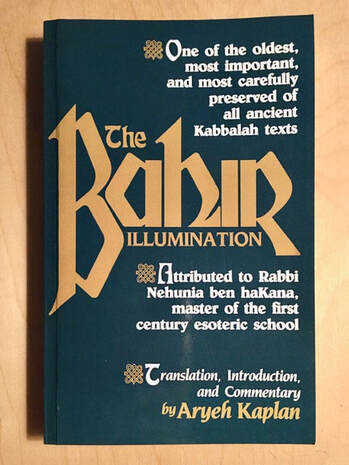
The Book Bahir
The Book of Lights
The Book of Illumination
Aryeh Kaplan
From Sefer Yetzirah I ran immediately to this. After my discoveries there, I had no expectation of clarity from this one, but I did need to know what was in it in a general sense. I was delighted. My copy is filled with highlighter, from beginning to end. Initially, I found the Bahir more satisfying and more direct, once more with diagrams and discourse on the letters.
Still, I knew I should set it aside until I had a better understanding of general contexts and concepts. It has now been several years, maybe six, since I last went into Bahir, and I would be less seeking now, and more observing. Who knows what would alert my awareness now? It is so RICH.
Purchased in 2016
Added to page Nov 8, 2022
The Book of Lights
The Book of Illumination
Aryeh Kaplan
From Sefer Yetzirah I ran immediately to this. After my discoveries there, I had no expectation of clarity from this one, but I did need to know what was in it in a general sense. I was delighted. My copy is filled with highlighter, from beginning to end. Initially, I found the Bahir more satisfying and more direct, once more with diagrams and discourse on the letters.
Still, I knew I should set it aside until I had a better understanding of general contexts and concepts. It has now been several years, maybe six, since I last went into Bahir, and I would be less seeking now, and more observing. Who knows what would alert my awareness now? It is so RICH.
Purchased in 2016
Added to page Nov 8, 2022
June 2024~ This page is ongoing, for library updates. I let things slow down at times, to continue my reading, and forget to add some more books here. I have at least another twenty books to show you, and I look forward to doing so, as they are all excellent resources which have deeply enriched my life. Onward! FH
